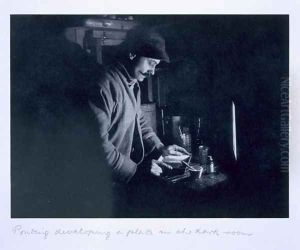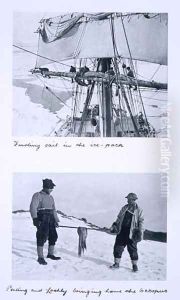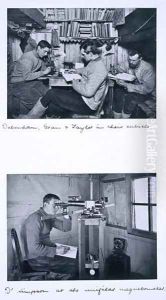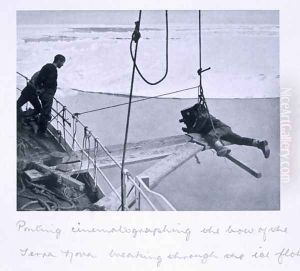Herbert Ponting Paintings
Herbert George Ponting was an accomplished British photographer and cinematographer, renowned for his pioneering work in the early 20th century. Born on March 21, 1870, in Salisbury, England, Ponting began his career in banking, but his passion for photography led him to leave his job and travel the world. His early work involved taking photographs during his travels to Asia, particularly in Japan, where he captured images that depicted the beauty and uniqueness of Japanese culture. His photography from this period was well received, and it helped to establish his reputation as a skilled photographer.
In 1910, Ponting's career took a significant turn when he was appointed as the official photographer and cinematographer for the British Antarctic Expedition, led by Captain Robert Falcon Scott. This expedition, commonly referred to as the Terra Nova Expedition, aimed to be the first to reach the South Pole. Ponting captured some of the most enduring images of the Antarctic landscape and its wildlife, as well as documenting the daily life and work of the expedition team. His photographs were technically innovative, utilizing the harsh Antarctic conditions to create dramatic and enduring images.
Ponting's work during the Terra Nova Expedition also included shooting moving film, and he is credited with creating some of the earliest film footage of Antarctica. His films and photographs played a crucial role in informing the public about the challenges and experiences of polar exploration. After the tragic end of the expedition, with the deaths of Scott and several team members, Ponting's images and films gained even more significance as a record of their heroic efforts.
Following his return from the Antarctic, Ponting continued to lecture and write about his experiences. He published several books, including 'The Great White South' (1921), which remains an important historical document of the Terra Nova Expedition. Ponting's contributions to the field of photography, particularly in the context of exploration, have been widely recognized. His work not only provided invaluable scientific records but also captivated the imagination of the public, contributing to the legacy of early polar exploration.
Herbert Ponting died on February 7, 1935, in London. His legacy endures through his extraordinary collection of photographs and films that continue to be exhibited and admired. Ponting's pioneering techniques and adventurous spirit have made him a significant figure in the history of photography and documentary filmmaking.



